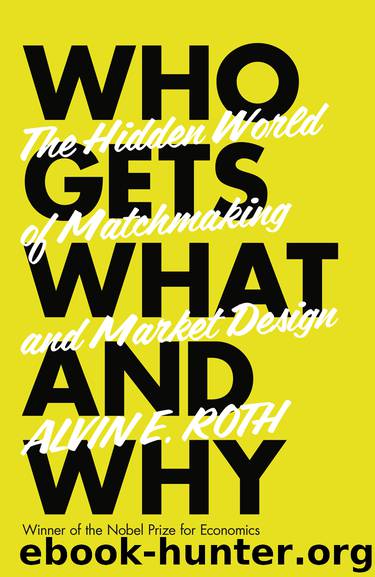Who Gets What--And Why by Alvin Roth

Author:Alvin Roth [Alvin E. Roth]
Language: eng
Format: epub
Publisher: HarperCollins Publishers
Published: 2015-04-13T04:00:00+00:00
A Cure for What Ails Doctors
Since about 1900, the first job American doctors take after graduating from medical school is called an internship or residency, in which they’re supervised by more senior docs. Over the past century, it has become a requirement for getting a license to practice medicine independently. (Before 1900, doctors graduated from medical school and immediately began to “practice” medicine without further supervision.)
Residency jobs quickly became a major part of hospitals’ labor force, a critical part of physicians’ graduate education, and a substantial influence on their future careers. Needless to say, there’s a lot of pressure on both sides to make good matches — on medical students to get good first jobs and on hospital residency programs to hire good young docs.
But almost from the start, something was amiss in the market for interns. An early symptom was that in their competition for scarce medical school graduates, hospitals began to try to hire interns a little earlier than competing hospitals. As a result, medical students were faced with decisions about internships earlier and earlier in their medical school careers. Students also were often forced to consider offers from one hospital at a time, without ever knowing what their prospects might be at other hospitals. This problem developed gradually, and you will recognize it as unraveling.
This unraveling of the market moved the date of appointment earlier, first slowly and then quickly, until by 1940 residents were sometimes hired almost two years before graduation. Just as picking Notre Dame to play in a bowl game was risky before the team had finished its regular season (see chapter 4), it was risky to hire a medical student two years before graduation. It was hard to tell who the good ones would be, especially since the first two years of med school are mostly spent in class, not with real patients.
As you can imagine, it was also hard for medical students to tell what kinds of jobs they might want two years hence. After getting an A in anatomy, a student might want to be a surgeon, only to discover in his third year, when he finally gets to scrub in to watch surgeries up close, that he faints at the sight of blood. But back in 1940, that would have been too late; he would have already been long since hired for the surgery internship he once thought he wanted. The student — and the surgeons who hired him — would both have made a bad match.
Although early hiring was pretty bad for both students and residency programs, we’ve already seen that unraveling isn’t solved by self-control. Only in 1945, when a third party — medical schools — agreed not to release information about students before a specified date, was the timing of offers controlled. The medical schools embargoed transcripts, letters of reference, and even confirmation that students were enrolled. This certainly helped control the date of appointments: it’s pretty risky to hire a student after his second year of
Download
This site does not store any files on its server. We only index and link to content provided by other sites. Please contact the content providers to delete copyright contents if any and email us, we'll remove relevant links or contents immediately.
International Integration of the Brazilian Economy by Elias C. Grivoyannis(107246)
The Radium Girls by Kate Moore(12009)
Turbulence by E. J. Noyes(8013)
Nudge - Improving Decisions about Health, Wealth, and Happiness by Thaler Sunstein(7685)
The Black Swan by Nassim Nicholas Taleb(7095)
Rich Dad Poor Dad by Robert T. Kiyosaki(6588)
Pioneering Portfolio Management by David F. Swensen(6278)
Man-made Catastrophes and Risk Information Concealment by Dmitry Chernov & Didier Sornette(5993)
Zero to One by Peter Thiel(5778)
Secrecy World by Jake Bernstein(4735)
Millionaire: The Philanderer, Gambler, and Duelist Who Invented Modern Finance by Janet Gleeson(4456)
The Age of Surveillance Capitalism by Shoshana Zuboff(4272)
Skin in the Game by Nassim Nicholas Taleb(4229)
The Money Culture by Michael Lewis(4182)
Bullshit Jobs by David Graeber(4170)
Skin in the Game: Hidden Asymmetries in Daily Life by Nassim Nicholas Taleb(3983)
The Dhandho Investor by Mohnish Pabrai(3747)
The Wisdom of Finance by Mihir Desai(3724)
Blockchain Basics by Daniel Drescher(3571)
